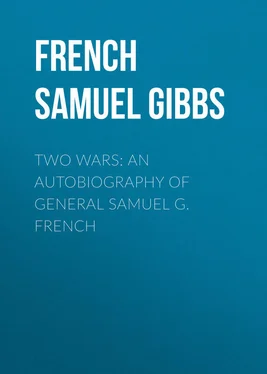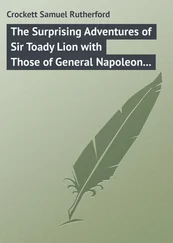Samuel French - Two Wars - An Autobiography of General Samuel G. French
Здесь есть возможность читать онлайн «Samuel French - Two Wars - An Autobiography of General Samuel G. French» — ознакомительный отрывок электронной книги совершенно бесплатно, а после прочтения отрывка купить полную версию. В некоторых случаях можно слушать аудио, скачать через торрент в формате fb2 и присутствует краткое содержание. Жанр: foreign_antique, foreign_prose, на английском языке. Описание произведения, (предисловие) а так же отзывы посетителей доступны на портале библиотеки ЛибКат.
- Название:Two Wars: An Autobiography of General Samuel G. French
- Автор:
- Жанр:
- Год:неизвестен
- ISBN:нет данных
- Рейтинг книги:4 / 5. Голосов: 1
-
Избранное:Добавить в избранное
- Отзывы:
-
Ваша оценка:
- 80
- 1
- 2
- 3
- 4
- 5
Two Wars: An Autobiography of General Samuel G. French: краткое содержание, описание и аннотация
Предлагаем к чтению аннотацию, описание, краткое содержание или предисловие (зависит от того, что написал сам автор книги «Two Wars: An Autobiography of General Samuel G. French»). Если вы не нашли необходимую информацию о книге — напишите в комментариях, мы постараемся отыскать её.
Two Wars: An Autobiography of General Samuel G. French — читать онлайн ознакомительный отрывок
Ниже представлен текст книги, разбитый по страницам. Система сохранения места последней прочитанной страницы, позволяет с удобством читать онлайн бесплатно книгу «Two Wars: An Autobiography of General Samuel G. French», без необходимости каждый раз заново искать на чём Вы остановились. Поставьте закладку, и сможете в любой момент перейти на страницу, на которой закончили чтение.
Интервал:
Закладка:
I shall never forget my voyage on the Hudson when life was young and all was bright and fair, and hope imparted a feeling of joy and gladness to all my environments. There were several candidates for admission to the Academy at the hotel. In the morning when I came down to breakfast I chanced to take a seat beside a smart-looking, black-eyed boy, and, finding him not inquisitive, I remarked to him, "I suppose you have a cadet appointment;" and in the twinkle of an eye he answered my question by exclaiming, "May I ask you the same question?" I was amazed, but reverting to his reply, I calmly and deliberately told him that his inquiry would be responded to first, and then he could answer mine at his leisure. That boy was from Connecticut. He graduated second in his class; his name is George Deshon; he is a Jesuit father, Redemptorist, and Paulist, and resides in New York City, spending his life for the good of a fallen race.
I was having a pleasant rest at the hotel, and had been there two or three days when an orderly made his appearance with an order for all the candidates for admission to report at headquarters. Frederick Steele, J. J. Booker, and I were assigned to a room in the south barracks.
I cannot recall to mind much about the examination; I only remember Capt. W. W. S. Bliss asking us some questions in a polite manner, and then dismissing us. In due time we went into camp. J. J. Peck, Vandergrift, and I were assigned to Company D, and occupied the same tent.
As the State of New Jersey was not divided into congressional districts at that time, it did not matter in what part of the State an applicant resided. There were four vacancies in the State, and they were filled by appointing Isaac F. Quinby, Shotwell, Vandergrift, and myself. Shotwell and Vandergrift left the Academy.
During the encampment Senator G. W. Wall came to the Point on a visit, and had all four of us call to see him. He expressed much interest in us, and gave us good advice, as he was personally interested in our success and welfare.
I carried with me to West Point a letter of introduction to John F. Reynolds, of Pennsylvania, who, as general in the Union Army, was killed the first day at Gettysburg. In his death the Federal army sustained an almost irreparable loss. He was a soldier of marked ability; kind, and, above all, was well loved, and the highest position in the service awaited him without his seeking it. He was ever kind to me, and later on, during the Mexican war, I was intimately associated with him. The officers of Bragg's Battery of Monterey were G. H. Thomas, J. F. Reynolds, and myself, and Reynolds and I occupied the same tent, and I never knew him to speak an unkind word.
Cadet life at the Academy has often been described, and it is so well known that I shall pass it by save with a few remarks. In the first squad of cavalry Grant, when a cadet at West Point, rode the horse that could jump a pole, one end against the wall about seven feet high while the other end was held by a soldier over the top of his head. In the second squad of our class Cave J. Couts rode the same animal. I never envied them their enjoyment, yet I rode a horse (properly named Vixen) that would go around the ring at a speed that would have distanced Tam O'Shanter's mare when she crossed the bridge of Doon and lost her tail.
One day as our section in mathematics was marching to recitation hall Frank Gardner produced an old silver-cased watch about four inches in diameter. It, as a curiosity, was passed along from one boy to another to examine; it chanced to be in Grant's hands as we reached the door of the recitation room, and he slipped it under his coat bosom and buttoned it up. The regular professor was absent, and cadet Zealous B. Tower occupied his chair. He sent four cadets to the blackboards, Grant being one. Grant had solved his problem and begun his demonstration, when all of a sudden the room was filled with a sound not unlike a Chinese gong. All looked amazed, and Tower, thinking the noise was in the hall, ordered the door closed, and that only made the matter worse. Grant, with a sober countenance, had the floor to demonstrate. When the racket ceased the recitation proceeded. Tower had no idea whence the noise came. Gardner had set the alarm in that antique piece of furniture concealed in Grant's bosom, and it went off. Tower's bewilderment and Grant's sobriety afforded us much amusement, which we could not manifest until we got outdoors, and roared with laughter.
Of all the cadets in our class, I believe I. F. Quinby possessed the most profound and the brightest intellect. It was scarcely necessary for him to study a mathematical proposition. One day, thinking he would not be "called up," he had not opened the text-book. However, Prof. Mahan sent him to the blackboard, and announced a proposition for him to demonstrate. In due time he faced the Professor ready to begin. He demonstrated the proposition in an original manner, frequently interrupted by the Professor, who failed to follow his reasoning, and would not admit the proof to be conclusive. Then cadet William F. Raynolds said: "Mr. Mahan, Mr. Quinby is right; I was attentive, and followed him all through." The result was Quinby wrote out his mode of demonstration and Raynolds handed it to the Professor next day, and the proof was conclusive. Professors are not inclined to have students deviate from the text-books. One day Grant failed to name the signs of the Zodiac, aries, taurus, gemini, etc., so I was asked, some time after, to repeat them, which I did as follows:
The Ram, the Bull, the Heavenly Twins, next the Crab the Lion shines, the Virgin and the Scales,
The Scorpion, Archer, and the Goat, the Man who carries the watering pot, and Fish with glittering tails.
and was told to translate it into the language of the text-book. Professors were not dependent on patronage, and there was no marked degrees of partiality shown any cadets. Prof. Wier kept one of my paintings in water colors that I regretted very much. One day, years after, I asked President Grant if he would not have the War Department issue an order to have it returned to me, and he said: "Certainly, and you may have any of mine that are there." He knew I well understood the humor in the remark about his paintings. However, I neglected to write to him and thus secure my picture. When I visited the Academy in 1881 I saw it hanging on the walls (and it is there now). Those that I left at my mother's in Woodbury, N. J., were confiscated and sold by the United States marshal, and this would have shared the same fate had it been there. After the Confederate war ended some of these paintings were returned to me. Such acts of kindness I appreciated.
When we entered the first class, as usual, we had accorded us the privilege of purchasing of the sutler, Mr. John DeWitt, many articles that were denied the junior classes. Owing to some of the class not being properly treated, the following document was drawn up, to wit:
We, the undersigned, do hereby agree that we will purchase nothing from John DeWitt after this date, except what we have already ordered, or whatever is absolutely necessary, the reason being supposed manifest to every one.

West Point, April 15, 1843.
To explain this boycott I copy a letter from Gen Rufus Ingalls to Gen. Isaac F. Quinby, sent to me by the latter when he received it. Quinby's familiar name was "Nykin."
Portland, Oregon, September 16, 1889.My Dear "Nykin:" Your letter surprised me most joyously. I was thinking of you constantly and lovingly. Do not give up. Let us live to the last possible hour. I hope to meet you this fall – late perhaps. I came here two years ago to stay three months, and here I am! I have had a "monkey and parrot time of it," as these slips 3 3 Newspaper cuttings.
will only partially disclose. Read them at leisure. But I am now booming in luck, … and I expect to save some money out of the wreck for myself and pretty wards. But what a fight all alone for it!
Интервал:
Закладка:
Похожие книги на «Two Wars: An Autobiography of General Samuel G. French»
Представляем Вашему вниманию похожие книги на «Two Wars: An Autobiography of General Samuel G. French» списком для выбора. Мы отобрали схожую по названию и смыслу литературу в надежде предоставить читателям больше вариантов отыскать новые, интересные, ещё непрочитанные произведения.
Обсуждение, отзывы о книге «Two Wars: An Autobiography of General Samuel G. French» и просто собственные мнения читателей. Оставьте ваши комментарии, напишите, что Вы думаете о произведении, его смысле или главных героях. Укажите что конкретно понравилось, а что нет, и почему Вы так считаете.












